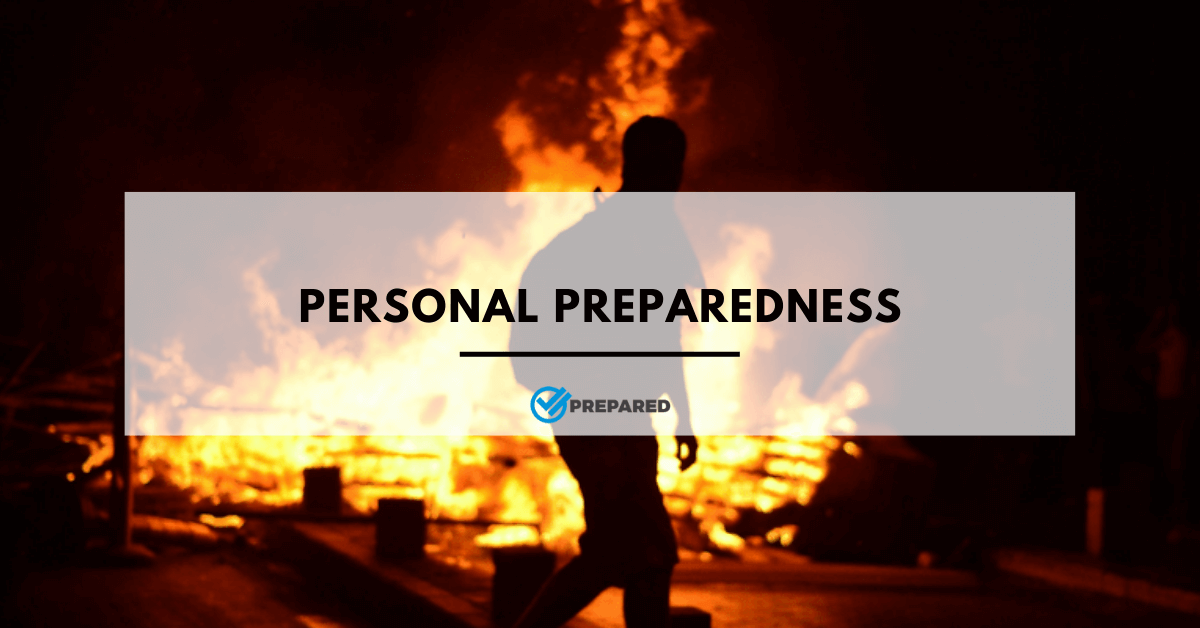When starting out in the field of disaster preparedness, there are different routes you can follow to improve your level of readiness. You can start out by acquiring new skills, such as learning how to make a fire, purify water or learn combat skills. You can also purchase supplies or equipment such as emergency food or water filters. Another option you can consider is to establish infrastructure such as building a greenhouse, digging a water well or even creating an underground shelter.
These are all valid options to consider along the way to becoming more resilient. However, it is important to decide on an overall strategy to follow to become more resilient. Without an overall strategy, you might find that you focus all your efforts on a single component of preparedness while missing out on another. In this article, I present six principles you can incorporate into your overall strategy.
Principle 1: Personal responsibility
The first principle towards becoming prepared is to take responsibility for yourself. The fact that you are reading this article suggests that you are already considering this. However, to put this into context, consider the following two examples.
The first example relates to healthcare. If you are fortunate enough to live in a country with a well-managed health care system, you will be able to access emergency medical care fairly quickly. However, in extreme situations, such as during major disasters, even the well-managed services can become overwhelmed with individuals seeking medical care. Also, disruptive events such as flooding or severe storms can impact on your ability to reach a medical facility, or prevent emergency medical services from reaching you. In these cases, you will have to find a way to look after yourself until you can reach help.
The second example relates to law enforcement or security services. In the normal day-to-day functioning of society, there are enough members of the security services to maintain law and order. Under extreme situations, such as widespread unrest, this might not be the case. The capacity of security services will be under strain, and law enforcement officials might not be able to respond to your call. During these cases, you will have to find a way to look after yourself.
The need to take responsibility for yourself becomes even more important if you have a family or people to care for. In stressful situations, your dependents will look to you for help and support. It is, therefore, important to have a plan and be prepared for a situation where outside help may not be available when you need it. Take responsibility for your preparedness.
Principle 2: Have somewhere to go to (as well as a way to get there)
During some disruptive events, you will be able to remain at your house. However, in other cases, it might not be safe to stay at your house. This can be due to your home being damaged during an event such as an earthquake or severe storm. In other cases, it might not be safe to remain in your home due to health or security reasons. The second principle of preparedness, therefore, requires that you have somewhere else to go to.
During localized disasters, it might be appropriate to go to the house of family or friends in another suburb or city. However, in extreme situations, it might be required to get away from major urban areas and move to areas with lower population densities. There is a lot of information available in books and online on how to select a “bug-out” location. However, equally important is that you should have a plan on how you will get there as well.
ALSO SEE: The 15 types of items to add to your bug-out-bag.
You should also decide beforehand what the ‘trigger’ will be for you to evacuate your house as well as the method of transport and routes you can use. Consider that different events can each have a unique impact on roads and infrastructure. You also do not want to wait too long before you leave and become caught up when everyone else tries to leave as well. This second principle aims to enforce the idea that you should plan beforehand where you want to go, and how you will get there.
Principle 3: Stay alive
Whether you choose to remain at home during a disaster, or you decide to relocate to somewhere else, the third principle relates to how you stay alive during and following a disruptive event. This is a very broad topic and covers a range of activities aimed at meeting your needs for water, food, shelter, security, health care, and hygiene; just to mention a few. Your ability to stay alive also depends on your ability to protect yourself. It is therefore recommended that you also consider undergoing training to ensure you can defend yourself in a worst-case scenario.
There are multiple websites, books and training courses on the topic of preparing and surviving disasters. Consider your unique requirements, and determine what you will need, both at your house and at bug-out locations. Critically evaluate the advice, practice the skills, and acquire resource and equipment with discretion.
ALSO SEE: The Top 5 Survival Skills to Learn
Principle 4: Numbers count
The fourth principle relates to the establishment of a support network of people around you. The truth is that, in worst-case disaster events, you do not want a crowd of people around you. However, in most cases, you stand a better chance of survival if you are part of a group of people you can trust. You might also be able to achieve more in preparing for disaster if you pool resources and make use of the knowledge and skills of other people in the group.
Also, having a support network provides a level of redundancy; if you are out of town when disaster strikes, a member of your group can assist with helping your family, and vice versa. However, the keys to establishing a support group or network are trust, accountability, and shared responsibility. If you need more information on how to start a survival group, consider this excellent book, The Survival Group Handbook.
ALSO SEE: How to deal with non-prepper family and friends
Principle 5: Consider your Priorities
The fifth principle is one that not all preppers will agree with, and it relates to priorities. Often you find preppers so caught up in preparing for a future disaster that they forget to appreciate the gift of today. They allow the ‘panic to prepare’ to take control of their lives, leaving their finances in ruin, and relationships with their family and friends in tatters. This can jeopardise the long-term sustainability of your family relationships and financial position. Building a strong family and healthy relationships is just as much part of preparedness as buying that next item on your prepping wish list.
Sustainable preparedness does not only consider what to do if disaster strikes tomorrow; but also how to survive if a major disaster does not strike in your lifetime. How do you provide for your children’s education? How do you build a healthy relationship with your partner, family or friends? These are all questions to consider for long-term resilience.
Now, don’t get me wrong. I am not saying that in some situations there is not an absolute urgency to prepare. Furthermore, sometimes there is a need for strong leadership in the face of opposition. However, the challenge is to use your insight, intellect, and understanding in reading the signs and interpreting the development of a particular situation. When preparing with foresight, you might find that certain things need to be done today, and others can be left until next week; not because they are not important, but to appreciate what you currently have. Remember, “Prepare to live, do not live to prepare”.
Principle 6: Obedience
The sixth principle is also one not everybody will agree with. This principle relates to the importance of believing, submitting or subscribing to a higher power, cause or ideal. If your worldview suggests that you are the supreme authority in your life, then your decisions, approach to preparedness, and behaviour following a disaster will exhibit this belief. You may then also choose to ignore this sixth principle. On the other side of the spectrum, if you believe in God, and claim Him to be the highest authority in your life, your approach to preparedness should reflect that.
You cannot claim to trust in God and then run around in a constant state of panic. Also, if you believe you have a God-given responsibility to prepare, you cannot sit with your hands folded and wait for things to happen by itself. Only you can decide where the balance is for you personally. It is not ideal to prepare from a place of fear or panic. If you believe you are called to dedicate time, energy and resource to prepare, then also put in the effort to seek guidance and wisdom; and then practice obedience in what you believe you need to do.
Personal Preparedness for your Family
It does not matter if you are experienced in disaster preparedness, or just starting out; you need a strategy and plan to ensure that you achieve your objectives. This strategy can take various forms and aim to reach different outcomes. What I have presented here are six principles you might want to consider in developing your preparedness strategy.

Chris was born and raised in South Africa and has worked in the field of risk management, organisational resilience, and business continuity for more than a decade. During his career he has seen how private and public sector organisations benefit from effective risk management and business continuity planning. Realising that families and communities can also benefit from the same tools, methodologies, and principles, he started Prepare with Foresight.
Prepare with Foresight was launched to assist individuals and families to have the peace of mind that they will be able to recover from and successfully adapt to the consequences of adverse events.

